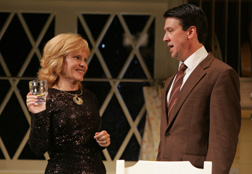
Reviews by Lucy Komisar
 |
| Absurd Person Singular -- Deborah Rush, Alan Ruck. Photo by Joan Marcus |
"Absurd Person Singular."
Written by Alan Ayckbourn.
Directed by John Tillinger.
Manhattan Theatre Club, Biltmore Theatre, 261 W. 47 St.
212-239-6200.
Opened Oct. 18, 2005.
Reviewed by Lucy Komisar Oct. 21, 2005.
Closes Dec. 11, 2005.
http://www.ManhattanTheatreClub.com.
Alan Ayckbourn's 1972 play "Absurd Person Singular" is a dark farce, not the joyous if scatterbrained kind one is used to in that genre. His slapstick has splinters. And in the end, the Manhattan Theatre Club revival is not satisfying either as comedy or tragedy.
Three British couples see each other in their three kitchens on three successive Christmas eves. They are from different economic and social classes: a banker, an architect and a lower middle class striver whose first dream is to build a general store. They are accompanied by their wives, who don't have jobs; this is 1972, just the beginning of the feminist movement. Through the two years, their economic and personal situations and relationships shift dramatically. Ayckbourn's dissection of relations between the classes and the sexes is the most successful part of the play. A subtle scene where the banker and architect laugh about women in a way that excludes the lower middle class bloke is presented masterfully by director John Tillinger.
Ronald Brewster-Wright, the hyphenated banker (portrayed with born-to-the-manor ease by Paxton Whitehead), maintains an upper class man's dry sense of self and self-confidence. Whitehead is the most believable character in the play. Sidney Hotcroft (Alan Ruck, with a TV sitcom facade) is a fellow without savoir faire no matter how many buildings he builds. And architect Geoffrey Jackson (Sam Roberts) has his bravado deflated like a stuck balloon along with his fortunes. Roberts is fine as the oily womanizer but less good in distress.
The women play asymmetrical roles. Sidney's wife Jane (Clea Lewis, on the edge of too much exaggeration), a good-natured fool obsessed with having a spotless house, only hints at any awareness that her husband treats her as he would a pet dog. Marion (Deborah Rush, in a rich and surprising characterization) starts out as a black sequined, soignée wife, only to descend into a tippler. We learn that Ronald, on appearances charming, is no more the ideal husband than Sidney or Geoffrey. And Eva (Mireille Enos, who seems to be playing three unconnected women) is first driven to desperation by the philandering Geoffrey, then suddenly becomes the assertive partner when professional difficulties take the wind from his sails.
If there is a shadow theme to the play, it is that the women should have been self-supporting, which might have won them more respect and control of their lives.
In a version of "laugh clown, laugh," the overlay of the serious play is farce and slapstick. But the jokes of what goes wrong at the three parties are cruel. Jane is shut out of the house in the pouring rain, Ronald gets an electric shock while tinkering with a light fixture, and the upper and middle class couples are humiliated by Sidney when he has enough money to literally call the tune – a clever metaphor.
However, the farce is only rarely clever. The action is often so slow moving, it begins to bore. Sometimes it descends to the level of television. Jane is getting tonic for a gin drink and Sidney says to shake it, so she shakes the tonic and it spurts out and wets a guest. It isn't funny. Marion gushes about the Hotcrofts' "modern" kitchen, and noting the washing machine indicators for white and colored, declares, "My god, it's apartheid." Witty – the battle over South Africa policy was raging -- but such remarks are few. The farce is just not strong enough to engage the audience while it becomes aware of Ayckbourn's serious counterpoint. [Komisar]

| museums | NYTW mail | recordings | coupons | publications | classified |